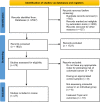Family history of cancer as a potential risk factor for colorectal cancer in EMRO countries: a systematic review and meta-analysis
- PMID: 37838786
- PMCID: PMC10576738
- DOI: 10.1038/s41598-023-44487-8
Family history of cancer as a potential risk factor for colorectal cancer in EMRO countries: a systematic review and meta-analysis
Abstract
The current meta-analysis aims to investigate the existing articles that evaluated the implications of a positive family history of cancer on the risk of colorectal cancer (CRC) within the EMRO countries. We employed PubMed, Scopus, and Web of Science as search databases for this study. To assess the quality of the selected articles, we utilized the Newcastle-Ottawa (NCO) checklist. In comparing the impact of a family history of cancer between the case and control groups, we computed the odds ratio (OR) along with its corresponding 95% confidence interval (CI). Finally, 27 articles were selected for meta-analysis. The result of the meta-analysis showed a significant association between the presence of a family history of CRC or any cancers and CRC (OR 2.21; 95% CI 1.54-3.17; P < 0.001, OR 1.76; 95% CI 1.27-2.42; P = 0.001, respectively). Our findings underscore the critical importance of timely screening and early identification for individuals with a family history of cancer. By fostering close coordination among healthcare facilities and actively promoting the adoption of screening methods for early detection, we have the potential to significantly reduce both mortality rates and financial burdens of CRC on the general public, ultimately leading to enhanced patient outcomes.
© 2023. Springer Nature Limited.
Conflict of interest statement
The authors declare no competing interests.
Figures





Similar articles
-
Association between smoking and colorectal cancer in Eastern Mediterranean Regional Office (EMRO): A systematic review and meta-analysis.Saudi J Gastroenterol. 2023 Jul-Aug;29(4):204-211. doi: 10.4103/sjg.sjg_163_23. Saudi J Gastroenterol. 2023. PMID: 37470665 Free PMC article.
-
Survival Rate of Colorectal Cancer in Eastern Mediterranean Region Countries: A Systematic Review and Meta-Analysis.Cancer Control. 2020 Jan-Dec;27(1):1073274820964146. doi: 10.1177/1073274820964146. Cancer Control. 2020. PMID: 33074714 Free PMC article.
-
Effects of Family History on Relative and Absolute Risks for Colorectal Cancer: A Systematic Review and Meta-Analysis.Clin Gastroenterol Hepatol. 2019 Dec;17(13):2657-2667.e9. doi: 10.1016/j.cgh.2019.09.007. Epub 2019 Sep 13. Clin Gastroenterol Hepatol. 2019. PMID: 31525516
-
Chemoprevention of colorectal cancer: systematic review and economic evaluation.Health Technol Assess. 2010 Jun;14(32):1-206. doi: 10.3310/hta14320. Health Technol Assess. 2010. PMID: 20594533 Review.
-
Effectiveness of Screening Modalities in Colorectal Cancer: A Network Meta-Analysis.Clin Colorectal Cancer. 2017 Dec;16(4):252-263. doi: 10.1016/j.clcc.2017.03.018. Epub 2017 Apr 4. Clin Colorectal Cancer. 2017. PMID: 28687458 Review.
Cited by
-
Disparities in Colorectal Cancer Screening Before and After the Onset of the COVID Pandemic.J Gen Intern Med. 2024 Nov 4. doi: 10.1007/s11606-024-09153-3. Online ahead of print. J Gen Intern Med. 2024. PMID: 39495455
-
Lifestyle, dietary pattern and colorectal cancer: a case-control study.BMC Nutr. 2024 Oct 17;10(1):138. doi: 10.1186/s40795-024-00950-x. BMC Nutr. 2024. PMID: 39420424 Free PMC article.
-
Epidemiologic profile of inflammatory bowel disease in Eastern Mediterranean Region (EMRO) countries: a systematic review and meta-analysis.BMC Public Health. 2024 May 24;24(1):1395. doi: 10.1186/s12889-024-18816-z. BMC Public Health. 2024. PMID: 38789987 Free PMC article.
References
-
- Lynch Syndrome. https://www.ncbi.nlm.nih.gov/books/NBK431096/.
Publication types
MeSH terms
LinkOut - more resources
Full Text Sources
Medical

